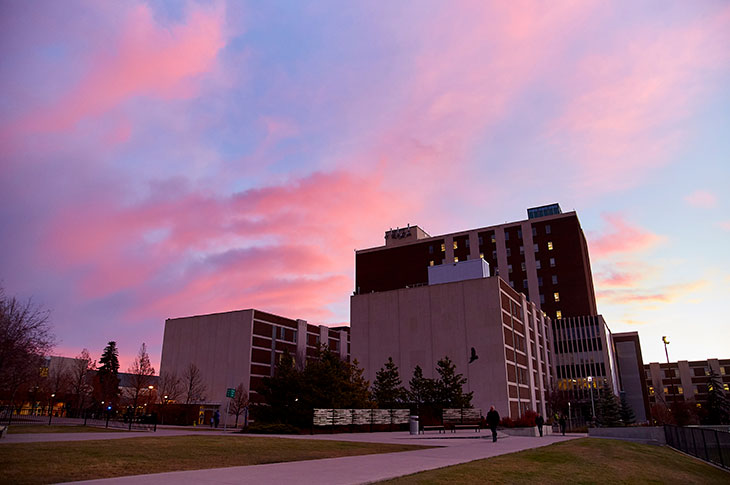Reassurance in hard times

Lina Yepes was just a few weeks away from finishing her Rehabilitation Therapy Assistant (RTA) diploma and starting a new and exciting career when the pandemic hit. And then she lost her job. Shortly after, she was diagnosed with breast cancer.
Her SAIT story began four years ago when she moved to Calgary from Colombia along with her husband and their eight-year-old daughter. Through volunteer work with the Calgary Immigration Society Yepes discovered a passion for social and healthcare work and decided to apply to the RTA diploma at SAIT.
“I was always interested in health care, but for some reason, I didn’t pursue it,” she says. “But when I decided to go for it, I looked at several programs and SAIT was definitely my number one school.”
Two years later and she was about to celebrate her graduation and start a career in rehabilitation — which came just in time as the family needed the additional income.
“We were already at the end of our savings which went towards paying for school,” she says. “So we were really tight money-wise as it was. But we saw the light at the end of the tunnel because I was about to work.”
“But then COVID-19 came and it turned out to be really difficult.”
To pay her tuition and other expenses, Yepes had worked part-time as a server while attending classes, and her husband worked in construction. When the outbreak began Yepes lost her job and her husband’s hours were significantly reduced.
“I was out of work and we were going day to day — if we didn’t work we didn’t eat. It was really, really stressful,” she says. “At the beginning, I panicked and I thought I’d find other work. But everything around me started collapsing.”
Just as things seemed like they couldn’t get any worse, Yepes was diagnosed with breast cancer as she was finishing her last semester.
“It was so hard, the last few papers, tests, it was just so much for us. We couldn’t pay rent, we were getting food from the food bank, no one could work, and on top of that I had my diagnoses.”
Yepes spoke with a Student Development and Counselling Department counselor who connected her to a number of resources across campus.
“The counseling saved my schooling because without her help, I would not have been able to finish the work I had to do,” she says. “I am so grateful to all the people at SAIT, my teachers, the academic chair, they helped me in every little way.”
Yepes’ counselor encouraged her to apply to the I.G. Lewis Student Emergency Fund, which had just initiated a call for support for students impacted by COVID-19.
“I was close to a breakdown and I told my counselor about it and how everything was getting tougher, and she suggested this emergency funding,” Yepes explains. “I thought, yeah maybe, but I’m sure I’m not the only one who needs it.”
But Yepes’ counselor convinced her to apply and she quickly received financial support.
“I was so relieved and happy because we were in a really tough spot,” she recalls. “I felt reassured that yes, I came here looking for something good for my family and this was a sign that we found it.”
The family was able to pay for their rent, groceries and bills with financial support.
Soon after, before she even received her final grades, Yepes found full-time work. She is now on the front-line of the fight against the pandemic in a long-term care facility in Calgary.
“I started two weeks ago and I love it. I’m so happy. I feel like I’m doing something worthwhile and useful, and that I am helping people who need it.”
Yepes begins chemotherapy next month. She says for now she is very happy.
Support from our donor family has helped nearly one hundred students impacted by the COVID-19 pandemic. Find out how you can make a difference.

Oki, Âba wathtech, Danit'ada, Tawnshi, Hello.
SAIT is located on the traditional territories of the Niitsitapi (Blackfoot) and the people of Treaty 7 which includes the Siksika, the Piikani, the Kainai, the Tsuut’ina and the Îyârhe Nakoda of Bearspaw, Chiniki and Goodstoney.
We are situated in an area the Blackfoot tribes traditionally called Moh’kinsstis, where the Bow River meets the Elbow River. We now call it the city of Calgary, which is also home to the Métis Nation of Alberta.